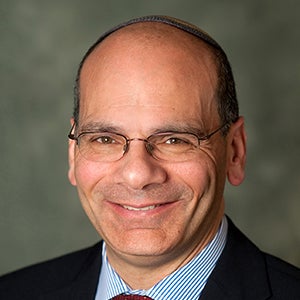November 1, 2018 — New York
This Shabbat cannot be like any other Shabbat. It is the Shabbat of the week of shivah for our eleven brothers and sisters who were brutally murdered as they joined together in a synagogue to pray, to celebrate our Jewish tradition, to be together with our people. They were murdered because they were Jews, at the hand of a man infected with antisemitic, racist, and xenophobic hatred. They were murdered because they were part of a Jewish civilization that welcomes the stranger and cares for those in need.
Above all, they were human beings, with families. They were, to the bereaved, fathers and mothers, husbands and wives, grandparents and great-grandparents, brothers and sisters. These families mourn their losses in a very personal way—a mourning that goes far beyond and much deeper than our communal pain. The Jews of Pittsburgh and their neighbors feel this massacre as an assault on their home, on their people. By all accounts, the victims were the good, the upstanding people, the backbone of their synagogue. They were the people who welcomed you at the front door, the joyful participants and the able leaders.
And we, the wider Jewish community, wherever we are on this Shabbat, from Jerusalem to New York, from Paris to Miami, from Mumbai to LA, wherever Jews are gathering in large numbers, in diverse synagogues and traditions, we feel the pain, anger, and loss of a people that is inextricably linked one to another. For we know that kol Yisrael areivim, that all Jews are responsible for one another, for each other’s welfare, for our wellbeing.
Now, as American Jews, we are confronting the reality that we dreaded and feared—it could happen here. We are mourning the loss of American Jewish innocence.
It is a Shabbat of sadness and mourning. But it must also be a Shabbat of defiance and continuity, a Shabbat of gratitude and thanksgiving. Synagogues all over the world will be more filled, rather than less filled. We will not run away. We will not cower. We will not allow the hate of a few to drive out the love of the many. We have been blessed by the many beyond the Jewish community who have joined us in our sorrow and defiance, not only by their presence in our synagogues this Shabbat, but by their statements and vigils of solidarity, declaring unequivocally: We are all Jews. Faith leaders, civic officials, and tens of millions of Americans have made it clear: An attack on one faith is an attack on all faiths. An attack on one American is an attack on all Americans.
It is a Shabbat in which we feel diminished, but it is also a Shabbat of appreciation. We salute and praise the first responders who engaged the evil without hesitation despite the real threat to their own lives. The first police officers on the scene and the many others who followed fearlessly demonstrated the values of elevated citizenship, of E Pluribus Unum, out of many—one. We thank them for the lives they saved and for the justice they pursue. We ask God to heal them of their wounds, to body and soul.
Our Torah portion this week, Hayyei Sarah, speaks of death, of continuity, of consolation, and it is instructive for us as a people and as individuals at this moment of crisis in American Jewish life. There is no massacre in the Torah reading, but there is insecurity. Abraham, the first of our Patriarchs, the father of the Jewish people, is old. We learn of the death of his beloved Sarah, the first of our Matriarchs, the mother of the Jewish people. Abraham is bereaved; he is vulnerable.
Abraham is already a wealthy and influential man, whom the Torah describes as a person who has made his mark on the wider society, in commerce and defense, and, no doubt, with his ethical monotheism. And yet, the trauma of the death of a loved one makes him unsure, uncertain of his place in the wider society. He says to the Hittites, the local majority, “Ger v’toshav anokhi eemakhem.” “I am both a resident and a stranger in your midst.” (Genesis 23:4) At a moment of terrible personal crisis, Abraham seems to lose his footing, not sure of his place in the wider world.
Many American Jews experienced the trauma of last Shabbat on multiple levels. Of course, we experienced the tragedy on the most human level, lives cut down, families permanently altered. But we also experienced it through our history of Jewish vulnerability. Could it happen here? What does the spike in antisemitism mean? We witnessed the intermittent violent antisemitic incidents and loss of Jewish life over recent years. We witnessed the massacres in churches, the torching of mosques, the damaging of synagogues, the rise in hate crimes, particularly against Muslims and Jews. We dreaded and feared the inevitable and it has now happened—the most deadly antisemitic carnage in our magnificent American Jewish history—and it scares us. Of course, we realize that this is the act of a madman, of a crazed bigot, but we also sense that something is happening, that the darker side of America, a side that had been subdued, is surfacing, sometimes with very violent consequences.
There was a lot at stake when Abraham seemed insecure. The future of the nascent Jewish people hung in the balance. And he regained his poise, buried Sarah and turned his focus to assuring the future of the Jewish people, to find a bride for Isaac so that the lineage he began with his beloved wife might continue.
We are far from being ready to regain our confidence. The wound is too fresh. The families are still in the midst of palpable trauma with multiple shivah homes and unbearable grief. But today we take a first step as a wider Jewish community, as a Jewish people, as Americans. We are aided immeasurably by the support of our fellow Americans of all faiths, races and ethnicities who have reached out to us as individuals and as a people with solidarity and comfort. We are grateful and buoyed by their support. Americans of goodwill have come together at a time of great need. If we stay together, love will prevail over hate, good will prevail over evil.
The journey for Abraham was a long one. He sends his servant, whom the midrash identifies as Eliezer, back to the old country to find a wife for Isaac. Her name is Rebecca. The narrative concludes with a beautiful verse, a rare moment of recorded patriarchal emotion. “And Isaac was consoled for [the loss of] his mother.” (24:67)
The bereaved families and community of Pittsburgh have only just begun to process the horrific that is so personal for them. We have only just begun to process the impact of this trauma for American Jewry. We are a long way from comfort and consolation.
Today we focus on praying for the health of the injured. May they be granted a refuah sheleimah, refuat hanefesh urfuat haguf, a speedy and complete recovery of body and soul.
We remember the 11 martyred Jews of Pittsburgh and mention each of them by name:
Richard Gottfried, 65; Joyce Fienberg, 75; Rose Malinger, 97; Jerry Rabinowitz, 66; Cecil Rosenthal, 59; David Rosenthal, 54; Bernice Simon, 84; Sylvan Simon, 86; Daniel Stein, 71; Melvin Wax, 88; and Irving Younger, 69.
Yehi zikhram barukh. May their memory be for a blessing.
Rabbi Noam Marans is the American Jewish Committee’s Director of Interreligious and Intergroup Relations.



